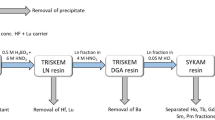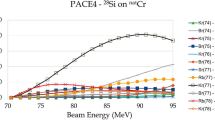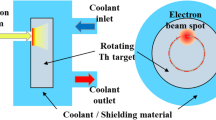Abstract
WE have been investigating the phenomenon of induced radioactivity in aluminium, boron and magnesium recently reported by Curie and Joliot1, and have been able fully to confirm their observations, and also to add further details. Using radium C-particles reduced in range to 6.1 cm., we find the relative yields of positrons during the entire decay from aluminium, boron and magnesium to be approximately 30, 10 and 7. Since the periods are respectively 3¼, 14 and 2¼ minutes, the initial effects are in the ratio 6, 0.5, 2. With all materials we find an effect with a period of about 1 minute and of initial activity comparable with that of boron. This must be due to some impurity which is always present, such as carbon, nitrogen or oxygen.
This is a preview of subscription content, access via your institution
Access options
Subscribe to this journal
Receive 51 print issues and online access
$199.00 per year
only $3.90 per issue
Buy this article
- Purchase on Springer Link
- Instant access to full article PDF
Prices may be subject to local taxes which are calculated during checkout
Similar content being viewed by others
References
NATURE, 133, 201; Feb. 10, 1934.
Author information
Authors and Affiliations
Rights and permissions
About this article
Cite this article
ELLIS, C., HENDERSON, W. Induced Radioactivity of the Lighter Elements. Nature 133, 530–531 (1934). https://doi.org/10.1038/133530b0
Issue Date:
DOI: https://doi.org/10.1038/133530b0
This article is cited by
-
Induced Radioactivity
Nature (1934)
-
Sulla Radioattività Provocata
Il Nuovo Cimento (1934)
Comments
By submitting a comment you agree to abide by our Terms and Community Guidelines. If you find something abusive or that does not comply with our terms or guidelines please flag it as inappropriate.



